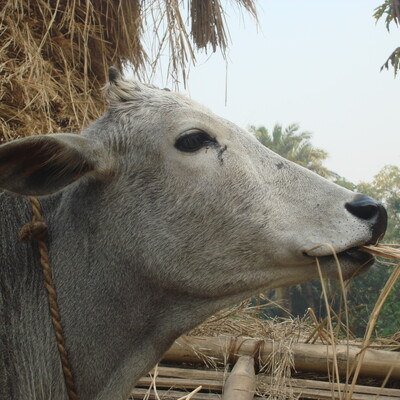
‘Safe Food, Fair Food for Cambodia’—Future directions for scaling up the project’s interventions
For two days last month (21–22 Jun 2021), food safety experts from across Cambodia and a research project team led by the International Livestock Research Institute (ILRI) gathered to discuss ways to disseminate findings and scale up interventions of a ‘Safe Food, Fair Food (SFFF) for Cambodia’ project that was ending after four years of operation.
More than 70 experts from Cambodia’s national institutes and central and provincial governments, civil society, academia and the private sector participated in the meeting.
Hull Davun, deputy director general of Cambodia’s General Directorate of Animal Health and Production, opened the meeting by reminding the participants that food safety and food security are key priorities of the Cambodian government, particularly in light of the need for the country to achieve the Sustainable Development Goals (SDGs). Foodborne diseases are not only a public health problem but also a barrier to smallholders who wish to sell products in high-value domestic and export markets. He noted that though six governmental ministries are involved in managing food safety and food quality—Agriculture, Forestry and Fishery; Commerce; Industry and Handicrafts; Health; Tourism; and Economy and Finance—their overlapping mandates constrain their ability to work in harmony and to implement a food safety and quality control system in the country.
Over the past four years, the Safe Food, Fair Food for Cambodia project investigated food safety aspects of the country’s smallholder pig and poultry value chains and generated important health findings said Hung Nguyen, the ILRI scientist who coordinated the project.
A key finding presented at the workshop was that microbial risks linked to improper hygiene and cross-contamination are likely to be responsible for most of the country’s foodborne disease health burdens. A market assessment conducted by the project from Oct 2018 to Aug 2019 in 25 provinces of Cambodia found a high level of biological contamination of pork, with Salmonella spp. (43%) and Staphylococcus aureus (31%) infected samples. These levels, while similar to those found in other low- and middle-income countries, are alarmingly high.
A retailer uses stainless steel trays to separate raw pork meat and intestines as recommended by the SFFF for Cambodia project (photo credit: NAHPRI/Rortana Chea).
Based on these and related findings, the project team tested ‘light-touch’ and low-cost interventions to improve the safety of pork and poultry sold in traditional markets across the country. Among the more hygienic practices the research team introduced were separation of ready-to-eat from raw pork meat and intestines, frequent handwashing as well as wipe-downs of meat-selling surfaces, and promotion of clean-pork branding to retailers.
At the June meeting, the project team listened to feedback from partners in six provinces where the project’s intervention package was piloted. In Siem Reap, the practice of cleaning equipment and disinfecting cutting boards was adopted. There were some challenges in other provinces with adoption of recommended plastic covers for chopping boards as the meat sellers prefer to use marble and stainless-steel boards. And the training provided by the project team did not always lead to improved food safety practices. Some consumers, for example, prefer buy their meat from the roadside rather than from market stalls where vendors handle meat more hygienically. The project’s partners argued for the need to engage more local stakeholders to scale up the project’s interventions. The additional stakeholders include market managers, who can monitor vendor compliance with good food safety practices, as well as officials of relevant ministries, who can help to improve the infrastructure of these traditional markets.
A handbook showcasing good hygience practices to retailers will be disseminated among local markets (photo credit: NAHPRI).
Following the meeting, the project team plan to help scale up their interventions among local markets by disseminating a video and handbook showcasing ‘Five key ways to retail safer pork in Cambodia’s traditional markets’.
Sothyra Tum, director of Cambodia’s National Animal Health and Production Research Institute, said that in addition to spreading interventions at the grassroots level, the project team advanced policy processes through the establishment of a taskforce on food safety risk assessment in late 2019. The focus of the platform this taskforce is developing is to strengthen advocacy of food safety policy and collaboration among government officials and food safety researchers working in the country. The taskforce is expected to continue its work, with continued support from ILRI, to scale up the project’s interventions beyond the six provinces involved in the project.
In his closing remarks, Dieter Schillinger, deputy director general for biosciences at ILRI, said he expected that the meeting would help serve to reinforce food safety recommendations among Cambodia’s several ministries and agencies concerned with ensuring food safety.
Gbola Adesogan, director of the Feed the Future Innovation Lab for Livestock Systems, called on the country’s private sector and civil society organizations to partner the government in scaling up the productive work achieved in this pilot project across Cambodia. He added that his lab will be looking for ways to spread adoption of this project’s interventions in other countries across the world.
About Safe Food, Fair Food for Cambodia
Safe Food, Fair Food for Cambodia, 2017–2021, is a four-year project of the Feed the Future Lab for Livestock Systems, which is managed by the University of Florida and ILRI and is funded by the United States Agency for International Development. The project is led by ILRI in partnership with Cambodia’s National Animal Health and Production Research Institute and Livestock Development for Community Livelihood, as well as Emory University, in the USA.
More information
Safe Food, Fair Food for Cambodia project: Task force and stakeholder meeting report


















